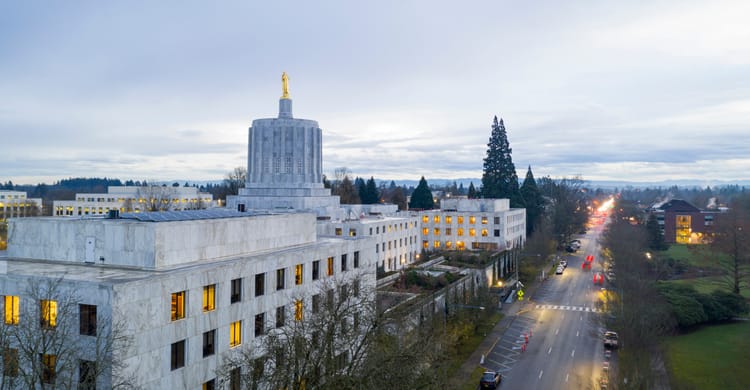Well, It's Groundhog Day in the Legislature, Again

The Takeaway
Lawmakers in Oregon seem to be stuck in a time loop as they revive proposals that have failed in previous sessions. The groundhog day-like situation is evident in the kind of proposals coming up in the legislature, such as legalizing motorcycle lane splitting, enacting sweeping campaign finance limits, allowing drivers to pump their gas, and increasing the retail sales tax rate local governments impose on marijuana sales. The proposals are brought up again despite coming up short in the past, suggesting lawmakers believe they have a better chance of success this time around.
For instance, the proposal to allow motorcycle lane splitting has come up multiple times and even emerged out of the legislature in 2021 with bipartisan support. Gov. Kate Brown (D) ultimately vetoed the measure, citing public safety concerns. Now, however, the legislature is trying again. Gov. Tina Kotek (D) previously supported the proposal and helped shepherd it through the legislature, signaling the executive branch may view the issue differently under its new leadership.
Similarly, the proposal to enact strict campaign finance reforms is like a car stuck in rush hour traffic—inching forward ever so slightly but ultimately going nowhere. However, there is an argument these talks could turn out differently this year. While the legislature is known to play whack-a-mole on this issue, good government groups are advancing ballot initiatives to force lawmakers’ hands or send the decision to voters. These groups are pursuing a proposal to enact their own version of campaign finance limits and a constitutional amendment requiring a supermajority vote to amend any voter-approved restrictions. The legislature has balked at ballot measure threats in the past, but the threat of a constitutional change could light a fire to tackle reform.
Legislature Rethinking Oregon's Approach to Growth
Growth seems to be a common theme among the many topics coming up in the legislature this session. In particular, the legislature is spending a substantial amount of time rethinking how it approaches making land available for growth. For decades, Oregonians prided the state’s land-use system as a way to preserve its natural beauty; however, lawmakers are learning the difficulties it presents in responding to economic emergencies and opportunities.
Land use is a recurring theme in the housing and semiconductor deliberations. Gov. Tina Kotek has set an ambitious goal to build 36,000 homes per year for the next decade to increase the state’s housing supply and, ultimately, reduce market costs. Concurrently, legislative leaders are working to attract investments from semiconductor manufacturers. In both discussions, the legislature must strike a careful balance between the competing interests of economic development and environmental conservation, ensuring that any changes to the land-use system are made with careful consideration.
Conservation groups are approaching their response to these issues differently. Recognizing the need to open lands for housing development, these groups worked with legislative leaders to zone available lands for residential housing. At the same time, conservationists are aggressively fighting the legislative efforts on industrial land, setting a potential clash between Democratic lawmakers and some of their closest constituencies. Lawmakers are walking a tightrope between progress and preservation. It’s a delicate dance lawmakers must perform to move the state forward.

What We're Reading This Week
- Across the country, organized retail crime theft is rising exponentially. Oregon Public Broadcasting reports on a pair of bills from the state’s retail industry seeking to enhance law enforcement funding and increase criminal penalties for those who engage in organized theft.
- Oregon Public Broadcasting reports that George Naughton, Oregon's longtime chief financial officer, announced he is stepping down from the role. His departure comes as legisalture begins negotiating the terms of the next biennial budget.
- An opinion article in The Oregonian argues the enterprise zone property tax exemption program is the state’s “economic lifeline,” especially since the state has eliminated most other economic development tools.
- The Oregonian reports the legislature is inching closer toward its initial package for the semiconductor industry, but there remains substantial work to be done later in the session.
- Oregon’s Office of Economic Analysis explores the potential economic effects of the record personal income tax kicker projected for 2024. In particular, the economists suggest the $3.9 billion kicker could result in a 1.3 percent boost in disposable income.
- KGW discusses a novel legislative concept to pay $1,000 per month to certain low-income and homeless individuals as a universal basic income pilot project. A column in The Seattle Times argues similar proposals will likely come up north, too.
- Oregon Public Broadcasting dedicated one of its "Politics Now" podcasts to a discussion on legislative efforts to reopen land-use practices to support the state's housing supply and recruitment of semiconductor firms.





